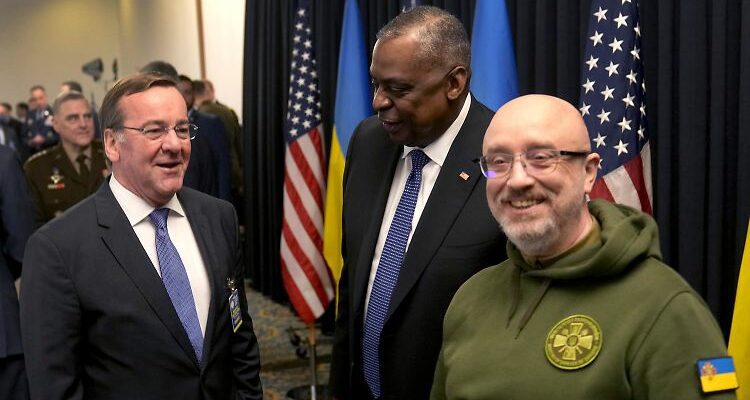A simple calculation is enough
Washington defends Berlin’s commitment to Ukraine
By Roland Peters
01/20/2023, 9:20 p.m
The USA soberly ironed out the “Panzer Punch and Judy show” in Ramstein, Rhineland-Palatinate. Secretary of Defense Austin even praised Germany’s involvement in the Ukraine war. That has to do with your own claims – and possibly the numbers.
As the day of the contact group meeting of Ukraine-supporting countries draws to a close, a reporter at the US air force base in Ramstein, Rhineland-Palatinate, historically poses heretical questions: Does the US continue to see Germany as a reliable ally? Does it show leadership? Is Germany doing enough? After all, it is not even possible to make such a simple decision as supplying main battle tanks. Ukraine’s Deputy Foreign Minister previously spoke of “tank puppet theater”.
US Secretary of Defense Lloyd Austin stands in front of media representatives and defends the federal government. Yes, Germany is doing enough. “We can all still do more. Germany has contributed a lot to this campaign.” The German colleague, Defense Minister Boris Pistorius, said clearly in the morning that no decision had yet been made on heavy battle tanks. For the federal government, such a clear commitment may already be a success. It underscores that their actions will not provoke an open rift in the alliance. Austin had already praised the Germans for their “strong support” for Ukraine on Thursday.
After hours of negotiations, Austin declared: “We put pressure on tanks.” But he also addresses the connection several times in a relativizing manner, i.e. the talks of all allies. It’s not about a single weapon system anyway, but about the whole package. What has now been agreed “will enable the Ukrainians to be successful,” he assures. “In 43 years I’ve never seen NATO as united as it is today,” says US Commander-in-Chief Mark Milley, who is standing next to him.
Milley also explains what success means: repelling an expected Russian offensive, maybe even driving Russian troops out of Ukrainian territory and finally concluding a negotiated peace in the interests of Kiev. For this, Ukraine obviously needs combat vehicles in particular. Many have already been promised, Austin emphasizes the German infantry fighting vehicle “Marder”. However, the German “Leopard” is in the center of interest because of its penetrating power. Several countries, including Germany, discussed future main battle tank deliveries separately. The United States has also not pledged heavy tanks. “I have nothing to announce,” says Austin.
More commitment than it seems
If you put the figures from both sides of the Atlantic side by side, the deliveries from Germany that have been promised so far are not small. On the contrary. The Federal Republic had a federal budget of around 500 billion euros last year. Their military aid to Ukraine totals 3.3 billion euros, or 0.66 percent. At the same time, the United States received $26.7 billion in military aid for Kyiv at $6.272 trillion – that’s just 0.43 percent.
Demonstrating unity: Defense Minister Boris Pistorius with his counterparts Lloyd Austin from the USA and Oleksiy Resnikov from Ukraine
(Photo: AP)
So to the legitimate question that some in the US are asking about how the war in distant Ukraine concerns them, the other NATO countries could give their own answer: “Not as much as we are. But we are also providing more aid overall. ” In addition, Joe Biden has proclaimed his presidency and the current decade to be a battle of systems between authoritarianism and democracy. The USA claims the leading role, which they now have to underpin with their commitment.
That’s what Austin and Milley referred to several times that day in Ramstein. In this understanding, Vladimir Putin’s war of aggression is also one against other democracies, against the right of peoples to self-determination, against the international order and thus against the allies of the USA. The United States has been providing military support to Ukraine since 2014.
The past year and the coming months are a continuation of this cooperation. “This war will become an absolute catastrophe for Russia,” the US commander-in-chief is certain. “As Russia’s cruelty increases, so does the determination of this contact group,” says Austin. Putin started the war, he can end it.
“A Difficult Campaign”
In Ramstein, the main focus was on air defense and armored vehicles. On the one hand to protect the population and positions from Russian attacks, on the other hand for a possible offensive that is to take place in the coming months. According to Milley, the time window for this is small, but the challenge is great. The US general hinted that the US was planning this spring campaign down to the last detail with the Ukrainian military leadership.
Austin had previously listed the tanks and air defense systems newly promised by the countries involved, Milley translated this into military alliance strengths and American dimensions: “It’s a very difficult campaign, a stable front line, a [von Russland besetztes] Area like from Washington DC to Atlanta.” All the necessary steps for the use of the new military equipment were discussed – from delivery and training to the coordination of the types of troops deployed to maintenance.
It will be very difficult to expel Russia completely this year, Milley said. “[Die Ukraine] can carry out an offensive, and then we’ll see where that leads.” Both sides have suffered heavy losses so far. “This is a very bloody war.” But, according to Milley, negotiations will only begin once Ukraine has gained status as a free, independent state can be assured.
